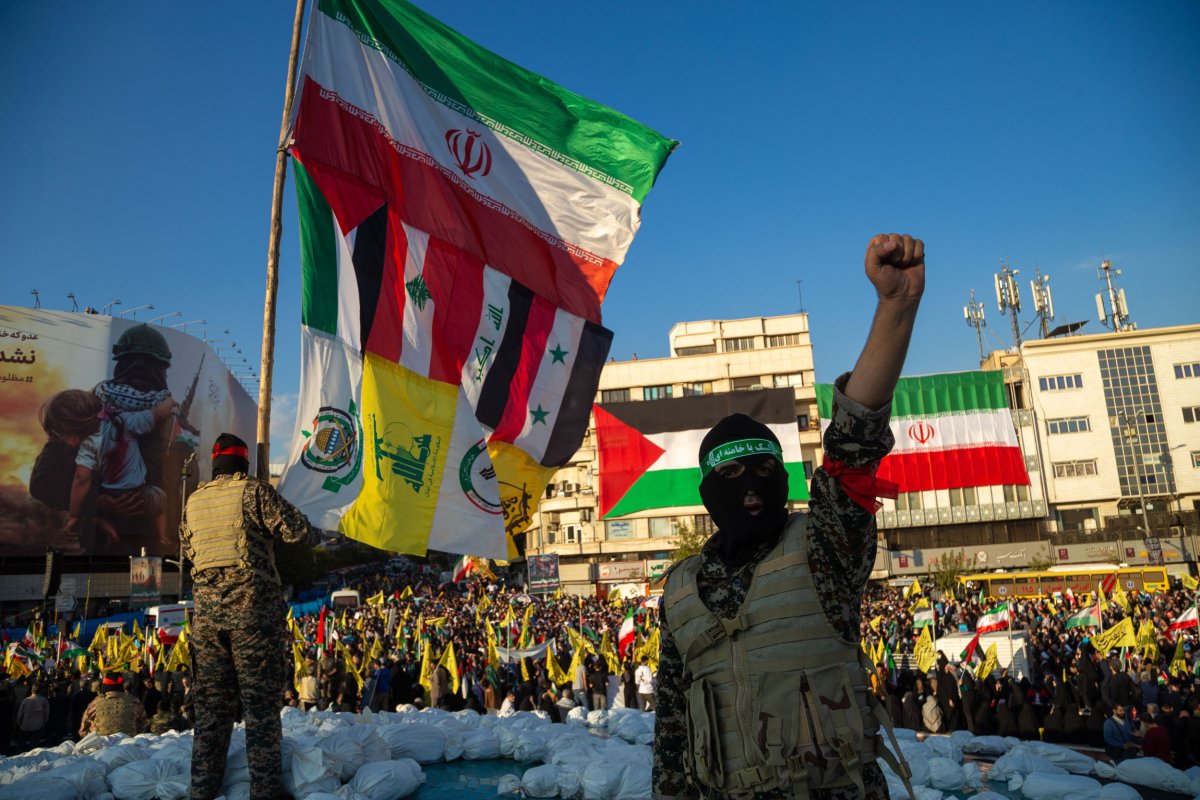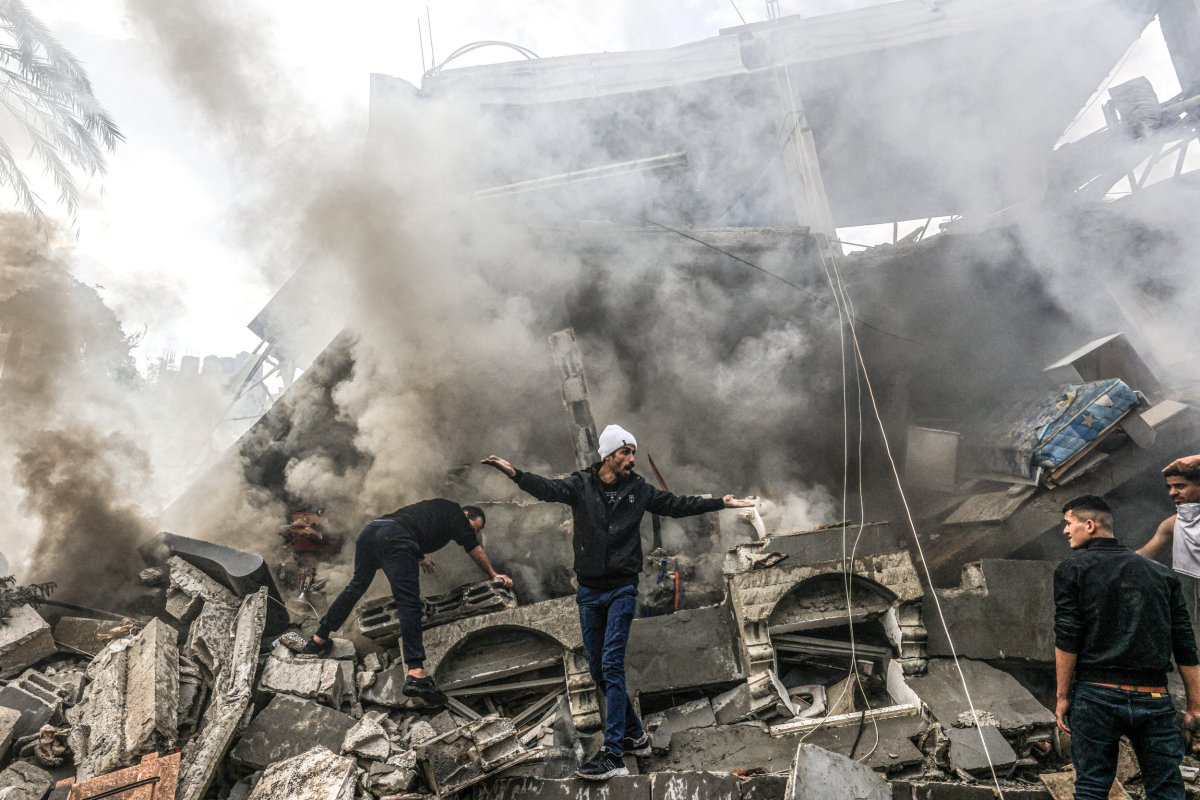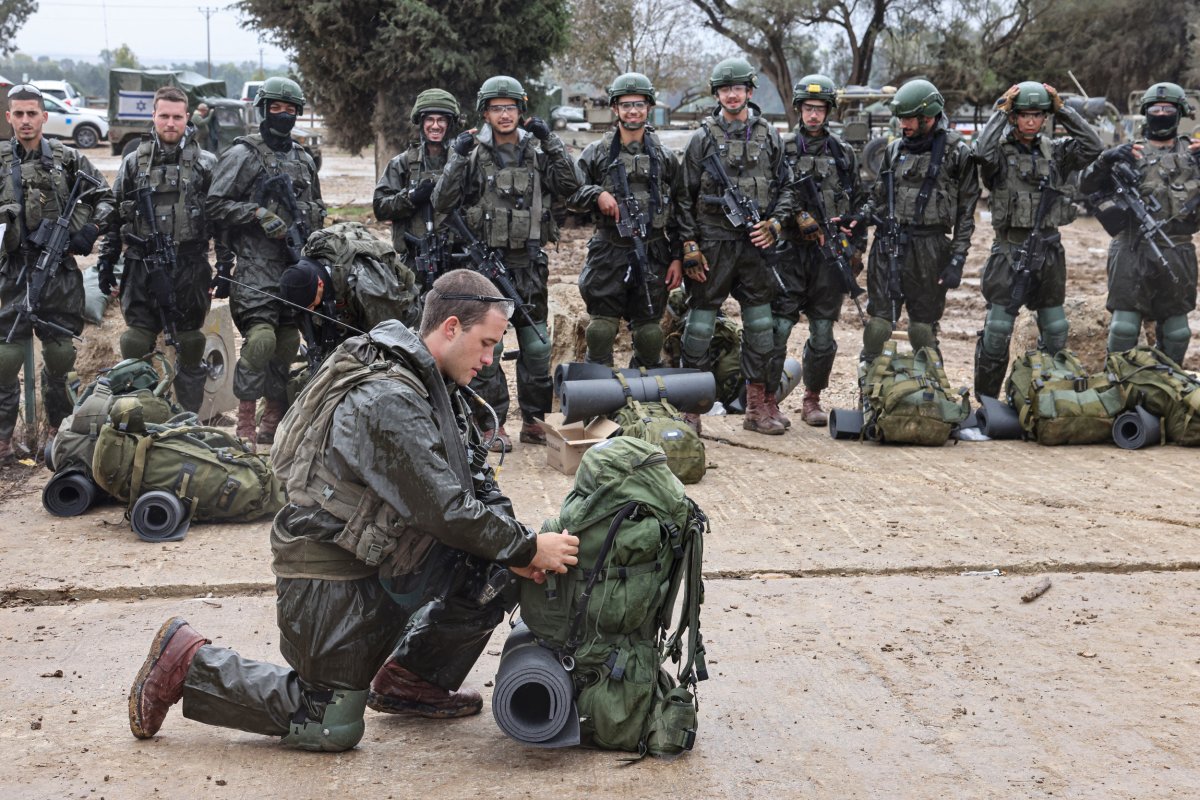Tom O'Connor
The Iranian ambassador to the United Nations has warned in an exclusive interview with Newsweek that President Joe Biden risked further hindering the United States' global image and influence along with his own election campaign if he could not bring an end to Israel's ongoing war in the Gaza Strip.
Throughout the interview, Amir Saeid Iravani, who was appointed as Iran's permanent representative to the U.N. last year, recounted a history of resistance factions that have emerged throughout the course of the decades-long Israeli-Palestinian conflict, as well as Tehran's crucial relationship with these groups and their cause.
Amid the deadliest-ever confrontation sparked October 7 by a Hamas-led surprise attack, Iravani defended the use of armed struggle by Palestinians, but stated such efforts were not aimed at Israel's destruction, nor should they target civilians. Rather, he said the underlying goal was to achieve statehood and an end to Israeli occupation, something he contended could not be achieved by military means alone.
But as he argued Israel's military campaign would only strengthen Hamas, he said that Israeli Prime Minister Benjamin Netanyahu was staking his own political future to success in Gaza, and that Biden needed an end to the conflict to score points in the run-up to his own 2024 election. And if the war persists, Iravani warned, it will only beget more Middle East headaches for the U.S. as its troops already faced regular attacks across Iraq and Syria.
Iravani: Prior to the 1979 victory of the Islamic Revolution in Iran, Palestinian militant groups predominantly espoused socialist ideologies. The genesis of the Hamas and Islamic Jihad Movement in Palestine stemmed from the influence exerted by the Islamic movement of the Iranian revolution. This influence instilled within them a profound self-assurance, fostering the belief that they could confront the occupier and emerge victorious. The enduring memory of Arab governments' defeats in the wars spanning from 1948 through 1982—the years 1956, 1967, 1973, and 1982—imbued a prevailing sense of despondency among the Arab nations. This despondency rendered them bereft of the capacity to mount resistance to Israel.
The inception of the Camp David Conference marked a pivotal shift in the trajectory of Arab countries, transitioning from a path of struggle toward one of compromise. It sought to engage in negotiations with Israel, aiming to reclaim portions of their occupied territories while extending a pledge of peace to the regime.
Concurrently, the emergence of Islamic resistance groups in Lebanon and Palestine during this period posed a foreboding challenge for Israel. Notably, Israel's withdrawals from southern Lebanon in 2000 and Gaza in 2005 did not stem from formal agreements but rather succumbed to the pressure exerted by the resistance movements.
Subsequent to these events, Israel's incapacity to effectively combat these resistance groups since 2006 has sounded the alarm for the regime's future. Israel attributes these transformations directly to the aftermath of Iran's Islamic Revolution, recognizing its role in altering the course of history for Israel.
The Palestinian cause intertwines with the essence and DNA of the Islamic Revolution. Shared aspirations aim to spell an end to occupation and affirm the rights of the Palestinian people, yet Palestinian groups independently employ diverse strategies and tactics toward this common goal.
Following Israel's withdrawal from Gaza, Hamas embarked on an electoral campaign to assume governance in Gaza. This move was strategic, aiming to engage actively in both political and jihadist spheres, implying a tacit acceptance of the Madrid Conference. Conversely, the Islamic Jihad Movement rejected this approach, steadfastly adhering to the jihadist path without entertaining compromise or participation in political endeavors.
In the broader framework of the resistance front, each faction operates with general coordination while maintaining independent decision-making, planning, and tactical approaches based on their unique national and organizational identities. During Operation al-Aqsa Storm, the military wing of Hamas autonomously made decisions, formulated plans, and executed them without direct consultation and coordination with other entities within the resistance front.

Men wave a flag combining those of Iran, Palestine, Lebanon, Iraq, Syria, Hamas, Hezbollah, Iraqi Popular Mobilization Forces and Fatemiyoun on November 18, 2023, in Tehran. Iran has denied having direct command and control over "Axis of Resistance" groups targeting Israel and U.S. forces across the Middle East, but has expressed support for their actions
What is at stake for Iran in the ongoing war in Gaza? Would Iran seek to take advantage of Israel being locked into a long, costly conflict, and also would a swift Israeli victory in removing armed Palestinian factions from Gaza mark a defeat for the Axis of Resistance?
The utmost priority for the Islamic Republic of Iran lies in safeguarding the lives of civilians. While Jihadi groups have willingly embraced the path of struggle, consciously bearing the associated costs for themselves and their families, it is imperative to shield ordinary individuals, particularly women and children, from becoming casualties of war.
Iran's unwavering stance advocating for an immediate and enduring ceasefire signifies a cessation of bombings and the tragic massacre of civilians in Gaza. The war between the resistance and Israel will persist until the occupation ends; however, it should remain confined to the battleground and not encroach upon civilians.
The military prowess of the Palestinian resistance does not aim to bring about the collapse or removal of Israel but rather serves the purpose of halting the expansion of occupation and compelling the evacuation of the occupied territories by this regime. Essentially, a regime equipped with nuclear weapons and ranking among the world's leading military powers cannot be dismantled solely through military actions. Therefore, the prospect of Israel's collapse will not transpire via military means but rather through internal factors. In such a scenario, the efficacy of this military power would not be instrumental in addressing the situation.
Resistance against occupation indeed embodies a cultural ethos. Contrary to diminishing in the wake of the demise of its' leaders, their sacrifice fortifies the resilience of the resistance movement. Their bloodshed serves to invigorate the cause, drawing more individuals toward the path of resistance. While Israel's actions may target figures within Hamas, it's clear that the organization cannot be obliterated. Instead, these actions amplify the strength of resistance, heralding the emergence of new fighters aligning with Hamas or the birth of entirely new groups committed to the cause of resistance.
The configuration of Hamas's political presence in Palestine might undergo shifts, yet the progression of its' military capabilities will definitely persist. It remains our firm belief that the Palestinian crisis cannot find resolution through military means; rather, the solution lies in terminating the occupation and upholding the fundamental principle of the Palestinian people's right to self-determination.

Palestinians react amid the rubble of destroyed buildings following Israeli strikes on December 14 in the southern Gaza Strip border city of Rafah. Israeli officials say around 1,200 people, mostly civilians, were killed in Israel during Hamas' October 7 attack, with around 115 more Israeli soldiers killed since a ground incursion into Gaza began, while Palestinian officials put the total death toll in Gaza at around 18,500, and possibly exceeding 20,000.
Israeli officials have told us that they will not tolerate a return to the pre-October 7th situation not only in Gaza, but also on the northern front with Hezbollah in Lebanon, and that they seek to neutralize the threat from a nuclear Iran. Are you concerned that Israel may choose to escalate its actions to change the reality on the ground on this border or to target Iran itself?
Israel lacks the capacity to undertake invasions without the unequivocal backing of the United States. As the Gaza conflict persists, the associated cost of this support for the United States is exponentially escalating. There arises a critical juncture where America must consider conditioning and constraining this support or risk falling prey to the thwarted ambitions of Israel's leadership.
Israel has increasingly become a burden for America in terms of material, political, and, notably, moral and reputational costs on the global stage. In such circumstances, neither America's strategic interests nor Israel's capabilities necessitate the initiation of a new conflict.
Netanyahu finds his political future tied to the continuation of the war on Gaza, while President Biden perceives his reelection prospects entwined with bringing an end to the hostilities. This conflict of interests becomes increasingly unmanageable as the war persists, posing a significant challenge.
Iran remains resolute in its stance of refraining from initiating a war with any country. Essentially, a preemptive war strategy holds no position within Iran's defense doctrine. However, the country maintains its highest state of preparedness to respond to any perceived threats and vigorously defend itself, its populace, and its interests.

Israeli soldiers prepare to go into the Gaza Strip, near the border area in southern Israel on December 13. Israeli Prime Minister Benjamin Netanyahu has said the war would not end until Hamas' threat to Israel was neutralized in Gaza and all hostages taken during Hamas' October 7 operation were brought home.
After the killing of Islamic Revolutionary Guard Quds Force commander Major General Qassem Soleimani in January 2020, his successor, Brigadier General Esmail Qaani, vowed to exact revenge against the U.S. while posing in front of the flags of Axis of Resistance factions from across the region. While Iranian officials have said they do not issue orders to these groups, does their current campaign against U.S. forces in Iraq and Syria reflect this goal, and are you concerned that the U.S. may choose to escalate against Iran as it did nearly four years ago?
We believe that the United States ought to conduct a comprehensive reassessment of its national security strategy concerning the Middle East. Twenty-two years ago, the U.S. led an invasion of Afghanistan with Security Council authorization, aiming to dismantle Al-Qaeda and the Taliban. What transpired? The outcome entailed exorbitant material costs amounting to trillions, the loss of thousands of lives and countless disabled individuals, the erosion of the American military and intelligence apparatus's credibility, and ultimately culminated in an agreement with the Taliban facilitating their return to power in Afghanistan.
A similar scenario unfolded in Iraq. Two decades ago, without the Security Council's authorization, the U.S. launched a military intervention into Iraq to topple Saddam Hussein's regime and transform the nation into a regional model through state and nation-building endeavors. Initially heralded as a liberator and a beacon of hope for Iraq and its populace, what transpired instead was a situation where the toll of losses surpassed even those experienced in Afghanistan.
A similar trajectory seems likely in Syria. The key lies in enhancing cognitive comprehension. As long as there persists a belief that resistance against them is orchestrated by Iran or other forces, the fundamental issues will remain unresolved. There was an assumption that eliminating the former Commander of the Quds Force would dismantle obstacles. Yet, not only did this fail to materialize, but their security became even more precarious than before.
Following the assassination, the U.S. government warned that if Iran retaliated militarily, it would strike 53 targets (symbolizing the number of U.S. diplomats held during the 1979 capture of the U.S. embassy in Iran). Prior to General Soleimani's burial, Iran conducted a direct strike on the American military base in Iraq from Iranian territory. Additionally, Iran issued a stern warning that any military response from the U.S. would be met with an even more forceful retaliation. We received a message that the former U.S. president deliberated the matter with military and national security advisers in the Oval Office, ultimately choosing to retire for the night!
America finds itself in a precarious position, having witnessed a decline in its influence and soft power and resorted to hard power and bolstering military presence as a compensatory measure. However, the American military bases in the region have contributed to exacerbating regional issues rather than serving as a solution.
It is imperative for the U.S. government to arrive at a strategic conclusion as to whether continuing the wrong and already proven failed policies aligns with its interests, or if charting a new course is necessary. The decision ultimately rests in their hands.
No comments:
Post a Comment